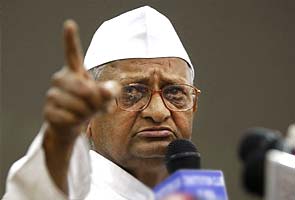 New Delhi, Mar 14: Controversial leader Anna Hazare, who left Trinamool Congress chief Mamata Banerjee red-faced two days back, today said he had skipped the poorly-attended rally because he was misled.
New Delhi, Mar 14: Controversial leader Anna Hazare, who left Trinamool Congress chief Mamata Banerjee red-faced two days back, today said he had skipped the poorly-attended rally because he was misled.
He maintained that he does not support any of the political parties but endorses Banerjee individually as she is the best of all the Chief Ministers of the country.
Breaking his silence on his absence at the much-hyped 'joint' rally with Banerjee at Ramlila ground on Wednesday, Hazare told reporters here that he had skipped as he had been misled.
He said he had been told that he had to attend rally organised by Banerjee while the Trinamool chief had been told it was Anna Hazare's rally.
"When I came to Delhi, by 12 noon I found out there were only 2000 or 2,500 people in the rally. I thought that something is amiss as the Ramlila ground had not even 4000 people even though it was teeming with people when he had staged protests there. This was the mistake, this was the dhokhadhadi (deceit)," he said, while naming one of the organisers for it.
Earlier, his aides had claimed that he could not attend the rally because he was "unwell".
His absence at the rally had left Banerjee embarrassed as the event to mark her arrival on the national scene had turned out to be a damp squib.
On whom he would endorse, the anti-graft crusader said he would not support any party because the country had not become a real democracy because of the party system.
At the same time, he endorsed Banerjee individually because he wanted a stable government to be formed in the country.
"I have respect for Mamata. Of all the Chief Ministers in the country, she is the best. Her sacrifice, her character, her ideology. I supported her and not the party," Hazare told reporters here.
Hazare said he did not approve of any of those currently in race for the Prime Ministership.





Comments
Add new comment